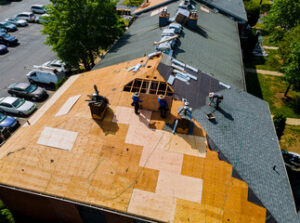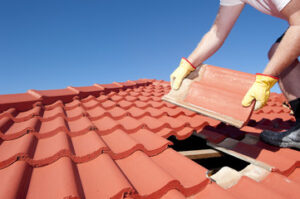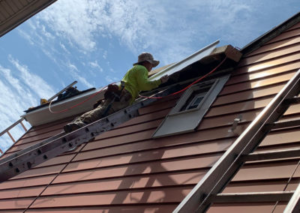The roof is the top part of a building that protects people and things inside from rain, wind and sun. Roofs can be made of wood, metal, clay or asphalt shingles.

Most roofers work on residential homes. They may install new roofing or repair existing roofs. They use ladders and scaffolding to access the roof. Contact Red Stick Roofing Of Louisiana for professional help.
A dripping faucet is more than just a nuisance. It can waste water and lead to more expensive repairs in the future. Fortunately, most faucet leaks are caused by small components that can be replaced easily at home. Most of these parts are standard and found at your local hardware store. If you’re not sure which part is causing the problem, take the old one with you to ensure you buy the correct replacement. It’s also a good idea to have a nontoxic plumber’s grease on hand. This will help you tighten any loose screws or nuts without damaging the threads.
Shut off the water supply before starting any repair work. Then remove the handle, using a screwdriver and Allen wrench. The decorative cap at the top of the handle may be difficult to remove, so you can slip a flathead screwdriver under it and pry it off. It’s important not to bang the handle; you could damage the inner workings and cause a bigger leak.
The main body of the faucet is held in place by a screw on top and a set screw at the back of the handle. You may need a pair of large, slip-joint pliers or an adjustable wrench to remove these. If necessary, use penetrating oil such as WD-40 to help loosen the screw. Once the handle is removed, you’ll be able to see the faucet assembly and unscrew the packing nut to reveal the stem. You’ll likely need to replace the O-ring that holds the stem in place. It can range in size from 3/8 to 5/8 of an inch, so make sure you get the right one and coat it with plumber’s grease before replacing it.
Once you’ve unscrewed the stem, you can remove the disc cartridge and replace it if necessary. If the cartridge is fine, the leak may be coming from a round, recessed disk called the retainer. If it’s pitted, you can grind it flush and add a new retainer ring to solve the problem.
Lastly, you’ll need to remove the adjusting ring (if applicable) by turning it counterclockwise with a spanner tool included in your repair kit. Then you can remove the plastic cam and packer. You can then replace the two rubber seats and springs, being careful to align them correctly.
Leaking Faucets
A dripping faucet might seem like an annoying little nuisance at first, but over time it can lead to expensive water damage and a financial sinkhole for your household budget. On average, leaky faucets waste one trillion gallons of water per year across the country. Even a small drip can cause the water meter to continue running, leading to an increase in your monthly water bills.
Most leaking faucets are caused by worn-out parts, and the parts that need replacing vary depending on the type of faucet. Older faucets may use ball valves, compression cartridges, or washerless cartridges with seats and springs; newer faucets often feature ceramic disc cartridges that don’t require any seat or spring. Before making a repair, it’s important to understand the different types of faucets and their parts so you can identify which part is causing the problem.
Corrosion and general wear-and-tear can cause the rubber seals that keep your faucet in place to deteriorate, creating tiny crevices where water seeps through. If left untreated, this can lead to corroded pipes and eventually, water leaks. Performing regular maintenance on your faucet can help prevent this from happening. You should regularly check the tightness of all the nuts and bolts on your faucet, especially the ones that connect to your shut-off valves and flexible supply tubes. Also, be sure to drain and wrap any exposed pipe in unheated areas to prevent freezing.
The rubber washer that creates a watertight seal between the valve seat and the spout can wear out from constant friction, resulting in dripping around the spout area. This can be fixed by replacing the worn-out washer. A new washer should be wiped clean before inserting it, and it’s a good idea to coat it with nontoxic plumber’s grease to ensure a strong, waterproof seal.
Leaks can also occur at the base of your faucet where the stem and handle are set into the counter. This can be due to a number of issues, including corrosion within your pipes, faulty valves, or high water pressure. These problems can be hard to detect because they’re often invisible, but a plumbing professional can use a special camera to check the interior of your pipes.
Leaking Pipes
Leaking pipes are more than just an annoyance; they can cause serious water damage to your home and contribute to the growth of mold, which is not only unsightly but also a health hazard. Fortunately, while pipe leaks often require the attention of a professional plumber, they can usually be fixed by homeowners willing to investigate and take immediate action. Before attempting to repair any leaky pipes, you must make sure that the power and/or water supply is turned off to the affected area of the house. It’s also a good idea to dry the area around the leak and to wear rubber or nitrile gloves when working on plumbing repairs.


